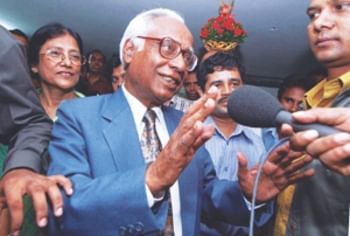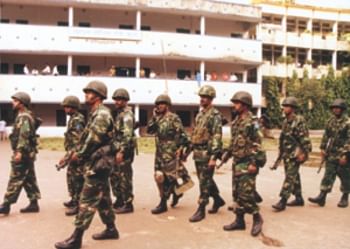| Home - Back Issues - The Team - Contact Us |
 |
| Volume 11 |Issue 49| December 14, 2012 | |
|
|
Current Affairs State of Emergency Shakhawat Liton
The way the country's political situation is deteriorating people do not find any way but to live in fear of a possible turmoil ahead of the next general elections. If the Awami League and Bangladesh Nationalist Party finally fail to come to a consensus to overcome the ongoing standoff, what will be the way out of a possible political impasse? The issue of the emergence of a “third force” has already been discussed. But the shape of the third is not clear to people--whether it will be an extra-constitutional force or a constitutional one. Amid the situation, Opposition Leader Khaleda Zia, all of a sudden, has provided fuel for ongoing speculations. Khaleda, also BNP chief, on November 28 at a rally of the BNP-led 18-Party-Alliance, said the government was desperate to remain in power at any cost. Citing rumours, she claimed that emergency would be promulgated. The following day, Prime Minister Sheikh Hasina, in the parliament, launched a blistering attack on Khaleda for her remarks about state of emergency. “Why will we promulgate the state of emergency? The question of declaring state of emergency does not arise!” the premier said. In the country's confrontational politics it is very normal for Hasina and Khaleda to make opposing statements, which they have been doing for a long time. So, it is difficult to take the two ladies seriously. Why and when does the government proclaim state of emergency? What are the consequences of the declaration of the state of emergency? As per the constitution the President may, with the prior counter signature of the prime minister, proclaim emergency if the president is satisfied that a grave emergency exists in which the security or economic life of Bangladesh, or any part thereof, is threatened by war or external aggression or internal disturbance. The issuance of the proclamation automatically suspends the operation of the fundamental rights guaranteed by articles 36, 37, 38, 39, 40 and 42 of the constitution. These articles deal with the freedom of movement, freedom of association, freedom of thought and conscience, and of speech, freedom of professions or occupation, and rights to property. No one will be allowed to file any case with the court challenging the validity of the emergency and suspension of the fundamental rights. And the government will have sweeping authority to enact any law regardless of inconsistency with the fundamental rights. So, it is clear that the proclamation of state of emergency cannot be expected by anybody. The framers of our constitution obviously were against the emergency provision and they were in favour of upholding people's rights. So, the original constitution framed in 1972 did not have emergency provision. But in 1973 the existing situation forced the then government to introduce the provision of emergency in the constitution in September the same year. Soon after the second amendment, the then president Mohammad Mohammadullah issued a proclamation of emergency in December 1974, and suspended many fundamental rights of citizens, on advice of the then prime minister Bangabandhu Sheikh Mujibur Rahman. Lock outs and strike were banned and fundamental rights were suspended through the emergency. In defence, the then government in a press note said that the emergency was proclaimed to curb anti-social activities. What was the situation then? There was a severe deterioration of law and order. According to an official figure 1,896 people were killed in violent incidents in 1973 alone. Setting fire to jute warehouses in different parts of the country frequently took place. An MP was killed in 1974. Even after the emergency was declared, the situation did not improve much. Two MPs were killed during the state of emergency in February 1975. And the deterioration prompted the then regime to go for a one-party rule by amending the constitution. The emergency was lifted five years later in November 1979 after a series of horrific events including the brutal assassination of Bangabandhu Sheikh Mujibur Rahman on August 15, 1975 and placing the country under martial law for a prolonged period.
After 16 years since the restoration of democracy through a mass upsurge in 1990, the country again witnessed a state emergency in 2007. Amidst growing political crisis over election, the then President Iajuddin Ahmed declared emergency on January 11, 2007. The political crisis started to deteriorate from January 3 after the AL-led grand alliance's decision to boycott and resist the January 22 elections. Amid boycott by the AL-led alliance, the BNP-led four party combine was desperate to have the election held by putting pressure on the then caretaker government led by Iajuddin and the then EC-led by Justice MA Aziz. But all efforts of the BNP-led alliance went in vain. Donor agencies and diplomats continued to mount pressure on the caretaker government and the political parties to resolve the ongoing crisis. They also warned that the elections would not be acceptable without the participation of all political parties. The BNP-led four-party alliance was not happy with the activities of diplomats and they were also vehemently opposing the issuance of emergency. In defence of the state of emergency, (Late) President Iajuddin said a grave emergency existed in the country in which the security or economic life of Bangladesh is threatened. And people welcomed the 2007 emergency which offered them an immediate relief from the growing street violence although the proclamation of emergency is not usually desired. The way the people extended their support to the emergency regime initially has also become a glaring example of how people were frustrated with the political situation. In response to Khaleda Zia's remarks, Prime Minister Sheikh Hasina in parliament on November 29 also said: “My question before the countrymen is whether she [Khaleda] is enforcing [agitation] programmes in the month of victory to bring emergency in.” The answer is clear to people as it was clear during the past emergency regime. The opposition parties led by Khaleda will not be able alone to bring emergency in. The role of ruling party and the government is very vital here. If the government continuously tries to outplay the opposition parties, then the opposition will of course try to gear up street agitation to realise their demand. The AL-led government is making almost the same political blunder the BNP-led alliance government had made in 2006-07. The BNP-led government had amended the constitution in a certain way so that a specific person-- Justice KM Hasan--could assume the office of the chief adviser at the end of 2006. The AL-led opposition parties vehemently opposed Justice Hasan and the end of October 2006 was marked by unprecedented street violence. This time, the AL-led government did something more. It abolished the caretaker government system as a whole, clearing the way for it to stay in office during the next parliamentary polls. The BNP-le opposition alliance has vowed to boycott the polls if they are held under the AL-led government. The government remains rigid on its stance and keeps rejecting the opposition demand. On the other hand, the opposition has decided to gear up their street agitations in the coming days to force the government to meet their demand. Opposition Leader Khaleda Zia has been saying the opposition parties will not allow any election to be held under AL-led government. Given the situation, the coming days, particularly the next one year ahead of the parliamentary polls, will be crucial for the nation's future. If the opposition parties do not join the next polls, will the Election Commission be able to conduct the polls with only the AL-led alliance like the way elections were held in February 1996? Will the opposition parties resort to more violent street agitations to resist the one-sided elections? What will be the way to overcome the political crisis? Emergency, like 2007? But the present constitutional position is different than the one in 2007, as the caretaker government system was abolished in 2011. So, repetition of an emergency regime like 2007 is not possible in 2013. What will be the option, then? Necessity finds its own ways! The writer is Senior Reporter, The Daily Star. |
||||||||
Copyright
(R) thedailystar.net 2012 |

